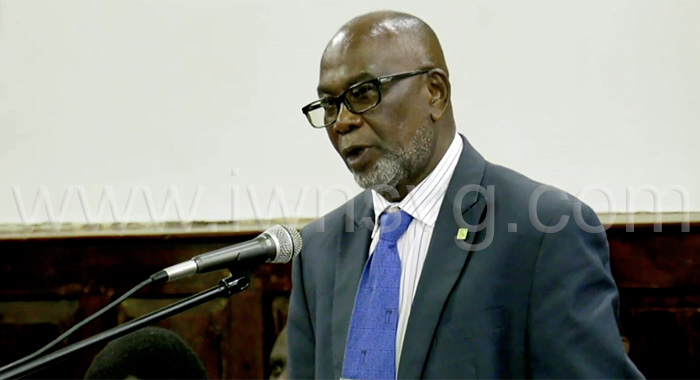Opposition politician St. Clair Leacock is warning that any increase in National Insurance Service (NIS) contribution rates could wipe out the salary increase to public sector workers that comes into effect this year.
He further said on NICE Radio, on Wednesday, that such an increase would also nullify the reduction in corporate income tax.
The NIS says that reforms, which have been considered for almost two decades, must take place by next year to avoid measures such as the doubling of contribution rates.
The contribution rate, which now stands at 10%, is paid 5.5% by the employer and 4.5% from the employee.
Leacock said he was not enjoining his New Democratic Party to helping the government to find a solution, adding, “I’m not going to be that fronting.”
He supposed that the government increases NIS contribution rate by 5 percentage points, split evenly between employer and employee,
“The government just gave the employees, two and a half percent increase. And two and a half percent increase in your contribution, you’re back to square one,” he said.
“Businesses, on the other hand, see the matter differently. They see the matter that if I have to pay two and a half percent more, for every employee, that that is a tax,” he said, noting that the government just reduce corporate income.
“So, you would erode some of the same tax benefits that you’re claiming they want to give government. So, it’s a kind of lose-lose situation for government. But you have to fix the problem. You can’t leave it,” he said, referring to the reform of the NIS.
Leacock was speaking within the context of the government having not tabled in Parliament actuarial reports on the NIS, as the law prescribes.
“So, the problem is that the NIS has that problem. But there are hidden things. There are hidden things inside of there that we don’t zero in on,” Leacock said, referring to the reform issues.
Leacock noted that actuarial science is a very specialised area, adding that when actuaries are doing their work, they have to have a basis on which they are calculating projections.
“The actuaries have to be guided by something,” he said, adding that they would have to know about demographics of the society, including the number of people who are certain ages.
“Because you want to know the high end, the low end and the bottom because all of those age groups are important.”
Leacock said that for a pension system to be successful, there must be more being paid in that is being paid out.
“And if you don’t have more water coming in to the reservoir than is going out to the reservoir, it will dry up it will finish,” he said.
The lawmaker used the example of a bucket with a two-inch hole in the bottom and a one-inch in-flow pipe.
“They have to bring it in at real pressure to make sure the bucket full through faster than the two inch that is leaking out.”
He said the government gets demographic information from the census, adding that the census is overdue.
“So, all those kinds of things go into the equation, because we are in 2023 now. Are you hearing census discussion taking place? So, we’re slipping even further,” he said, adding that the government would blame the April 2021 eruption of La Soufriere or the COVID-19 pandemic for the delay in the census.
“So, the next census might be able to be 2024,” Leacock said.
He further stated:
“So those are the issues, and this is what the government wrongly, wrongly, very wrongly, usurped upon itself, and defied the law,” he said, referring to the failure of the government to table the actuarial report in Parliament.
“If the board submitted to them the reports of the last actuarial reports at that stage, the government has no choice. It should bring it to the Parliament for oversight,” Leacock said.
“What the government then did is replace the oversight authority of the Parliament by the ULP (Unity Labour Party). So that you said with the executive branch of government, we are going to go to the World Bank to tell us if what we see in that report, to second guess the actuaries.”
Leacock accused the government of asking the World Bank “to satisfy a responsibility that the Parliament has.
“And if the World Bank, as it should, were to say, ‘But you know, there are conditions that you need to meet. Before we come in professionally to involve ourselves, have you satisfied the requirements of the law, that that document was lodged in the Parliament for accountability, so that you’re not now using us as a shield or an excuse, why that wasn’t done?'”
Leacock said that the information that Finance Minister Camillo Gonsalves gave in Parliament to his question last week about whether the reports had been tabled was “to drown our appetite and to figure, ‘Well, well, I hear something and it sound good. Don’t bother with the original question'”.
The lawmaker noted that his original question to the finance minister was why did the government ignore the Parliament by not lodging the actuarial reports, as the law dictates.
“And every time you have that question, you are essentially addressing two issues: one, accountability, which is of the moment … and you’re also dealing with a situation in which you are refusing to allow the Parliament to exercise its oversight responsibility,” Leacock said.
“And when you do that, you are, therefore, moving from accountability and the dereliction of duty with respect of oversight; it represents poor governance.
“Those are really issues for which they should be charged with misbehaving in public office. Those are misbehaviour in public office offences where things that occurred within law you consistently avoid the law.”






